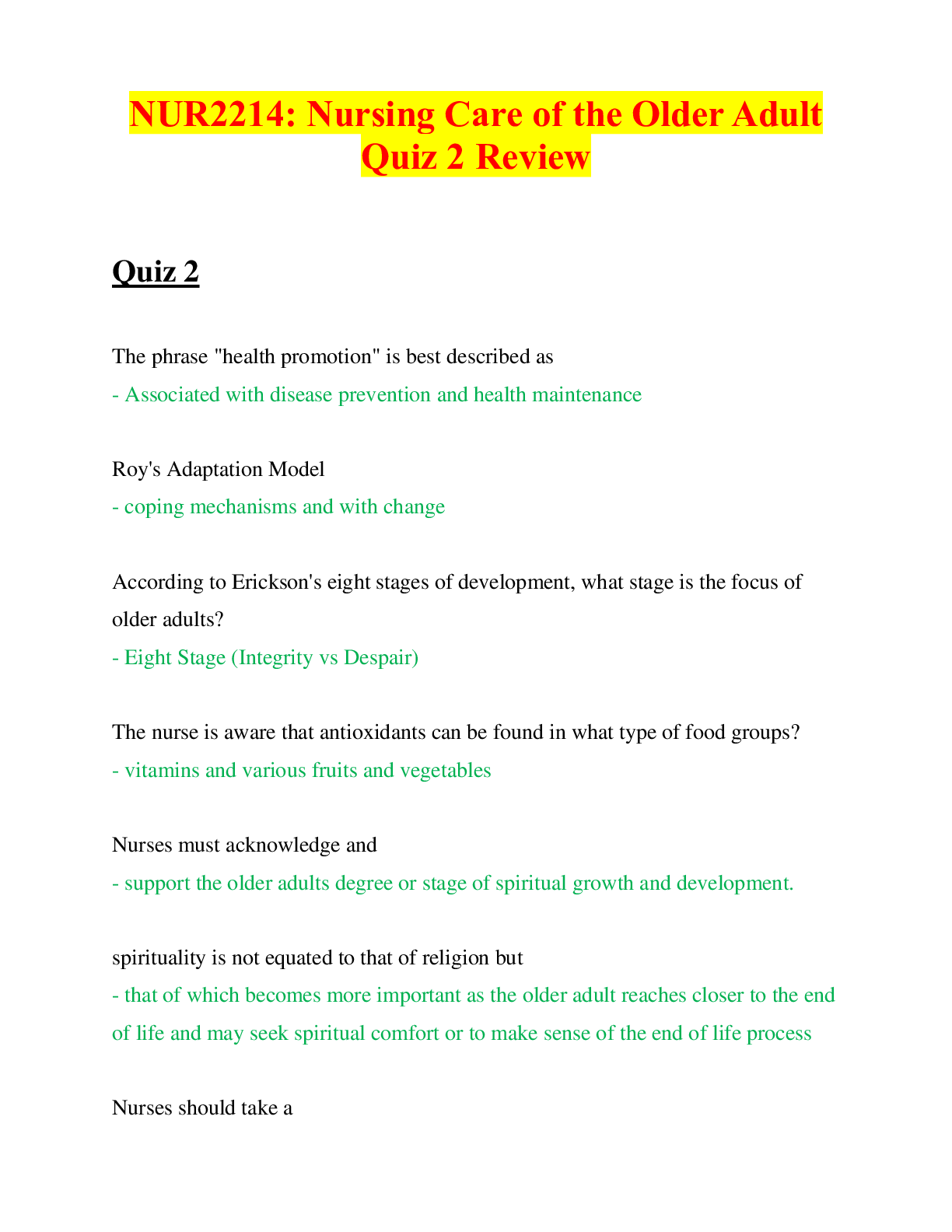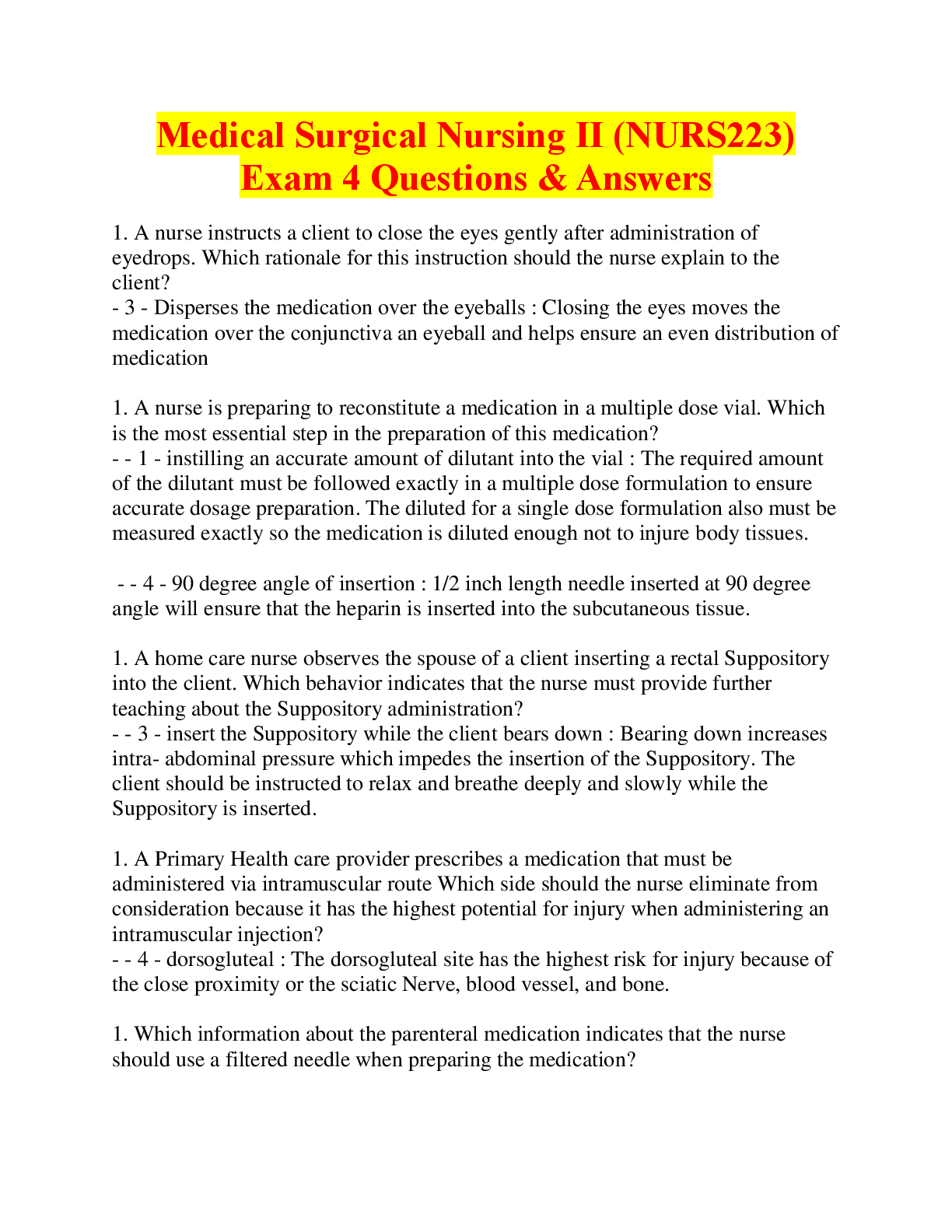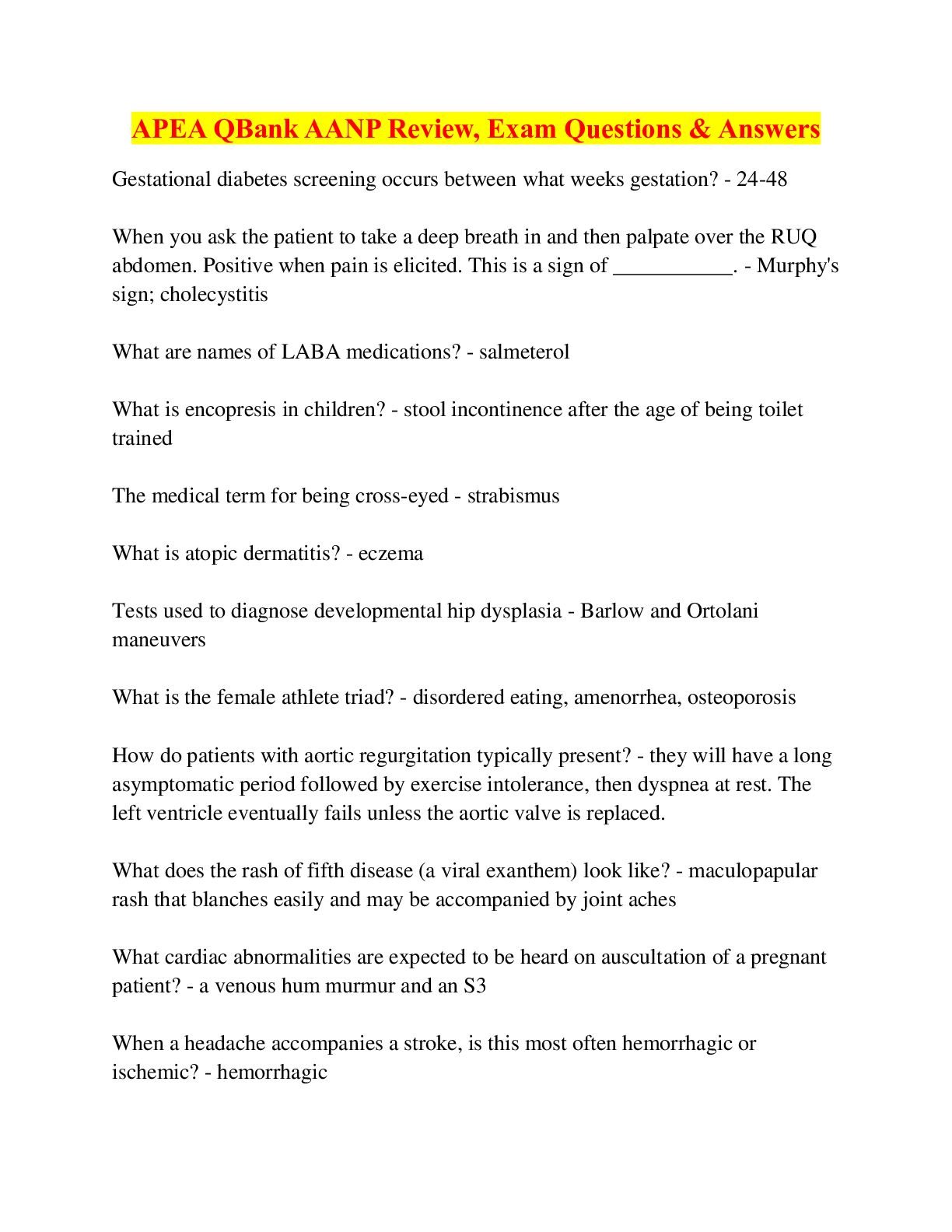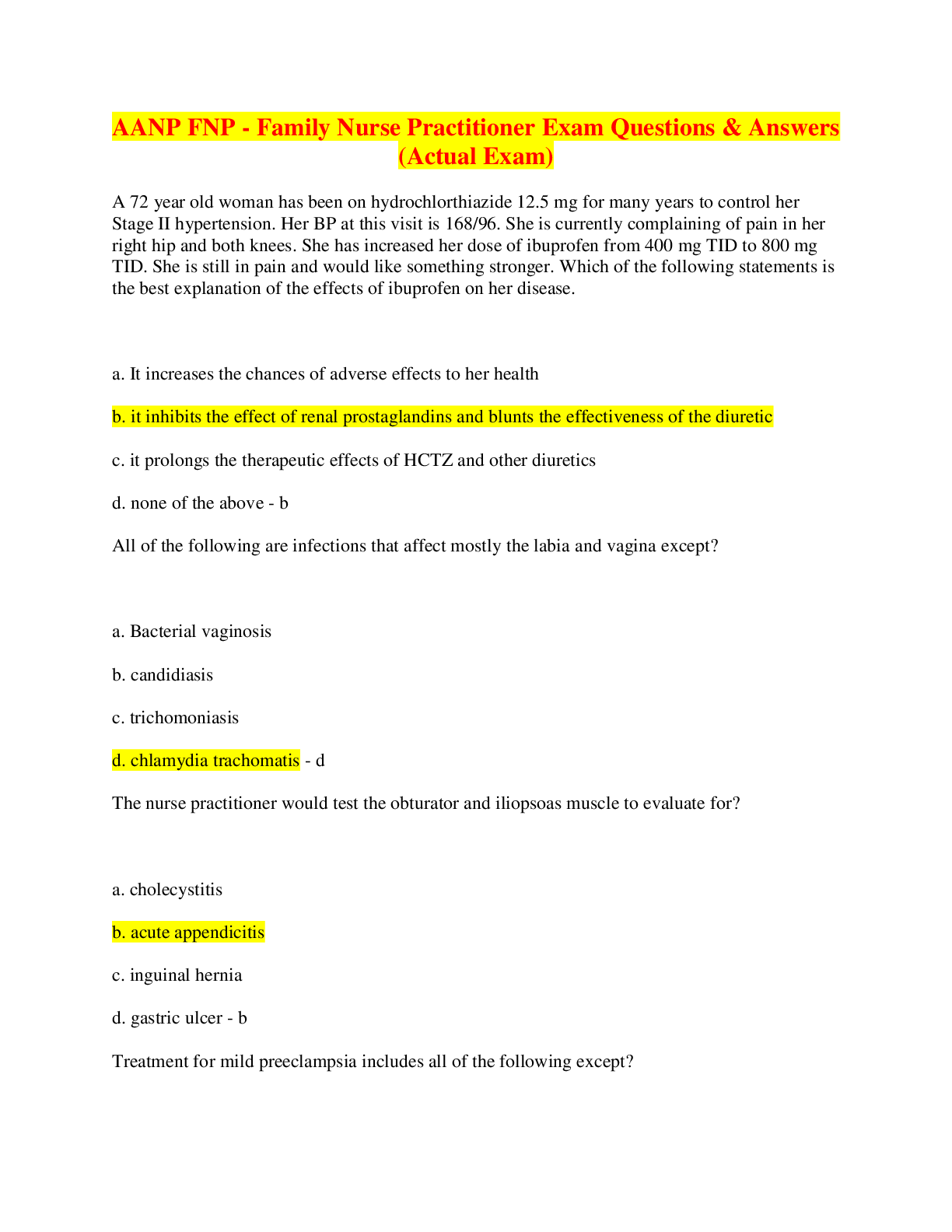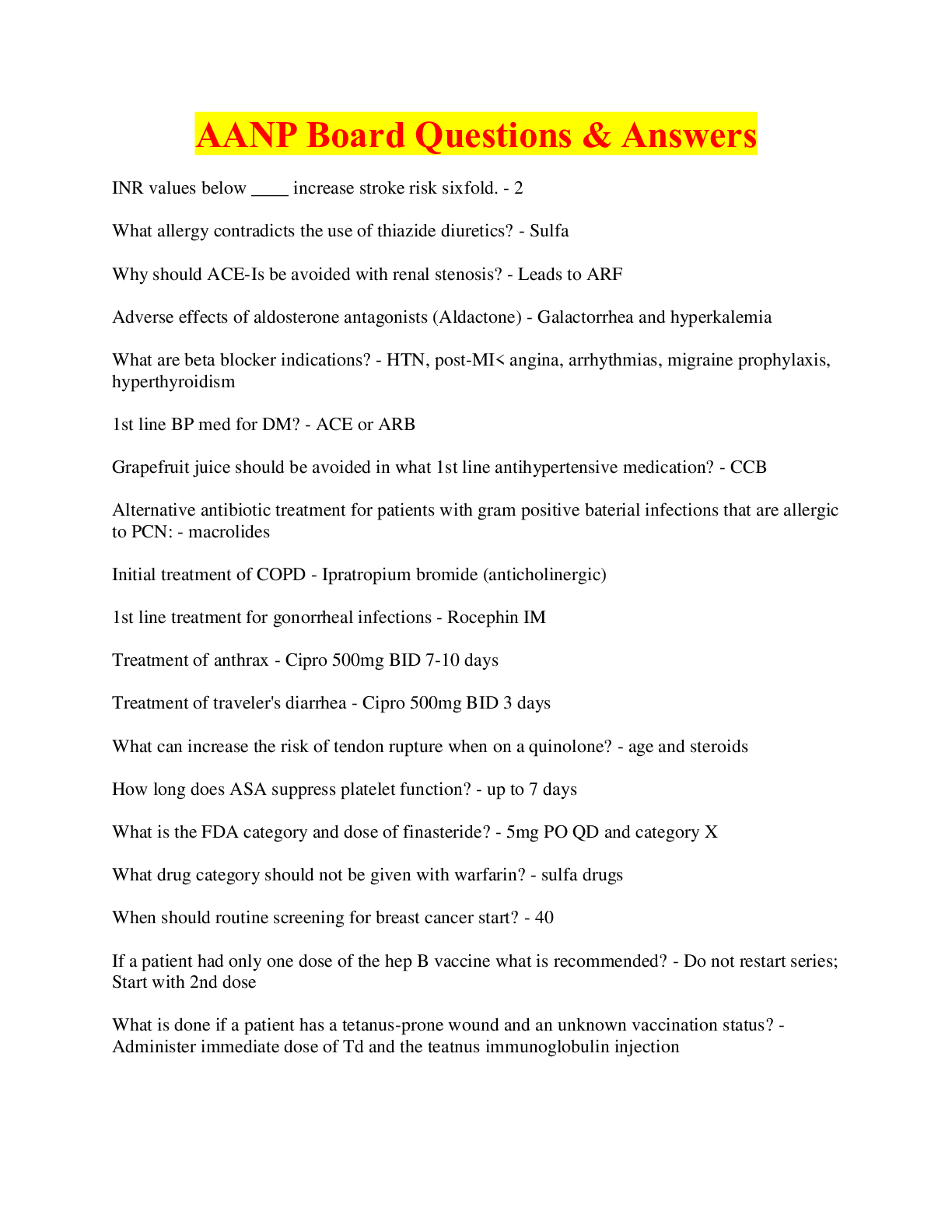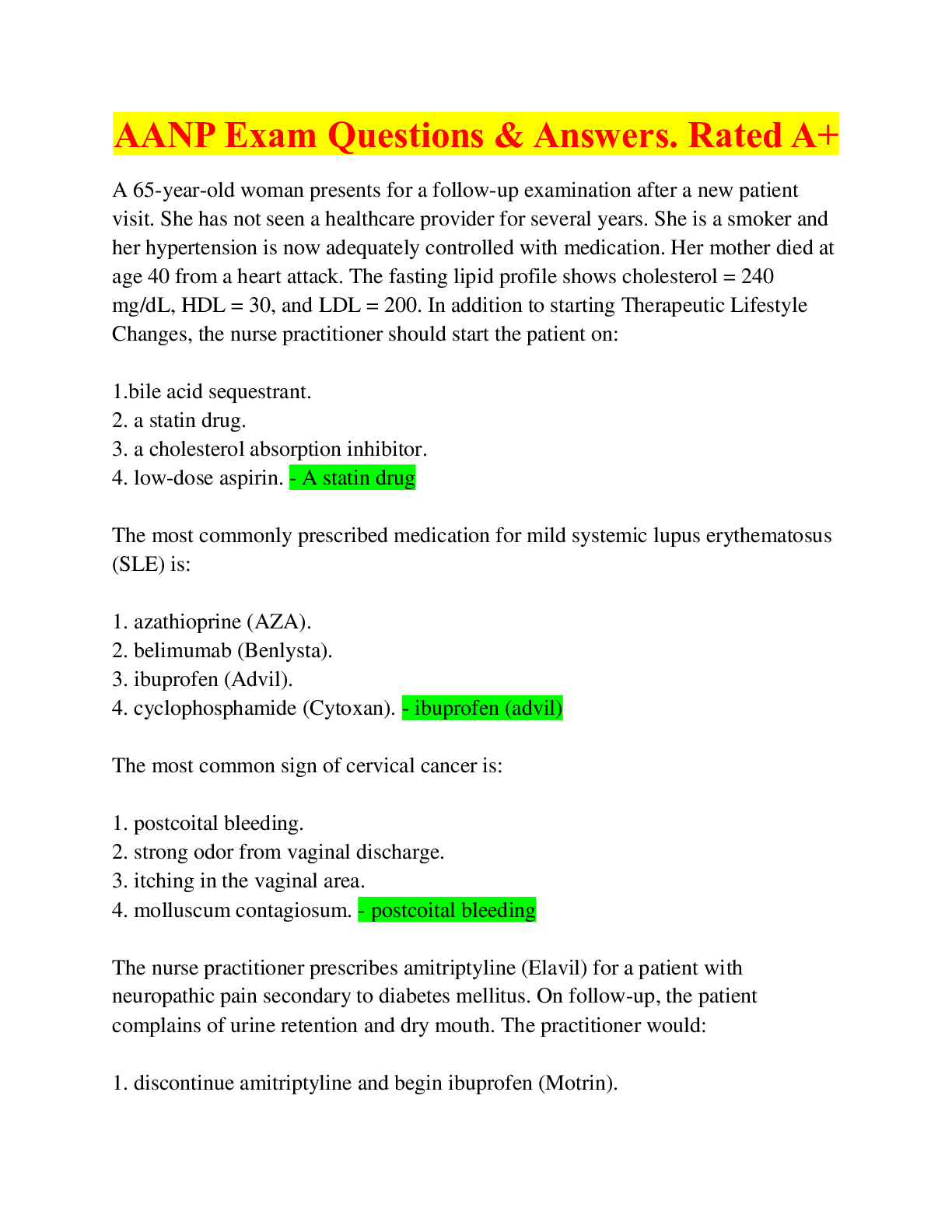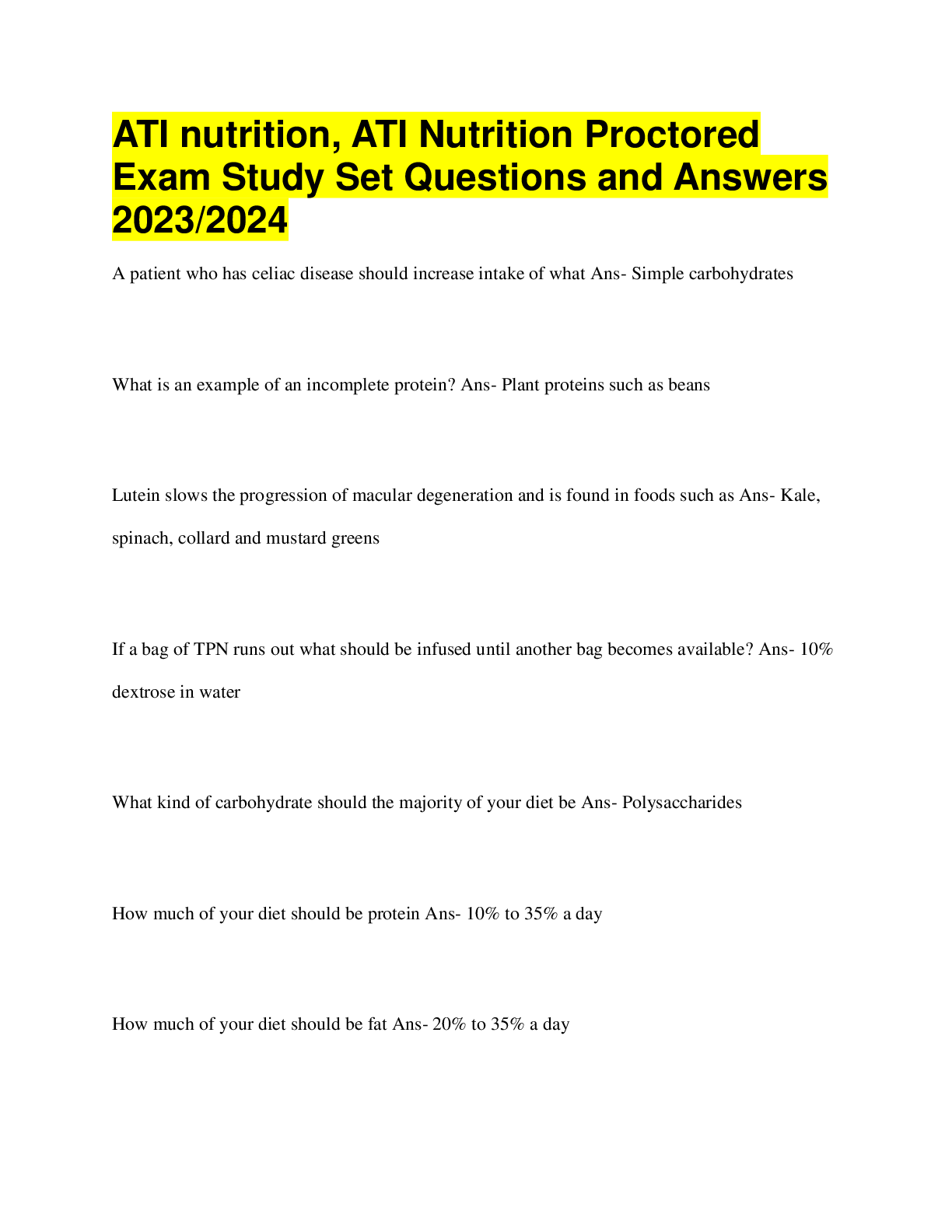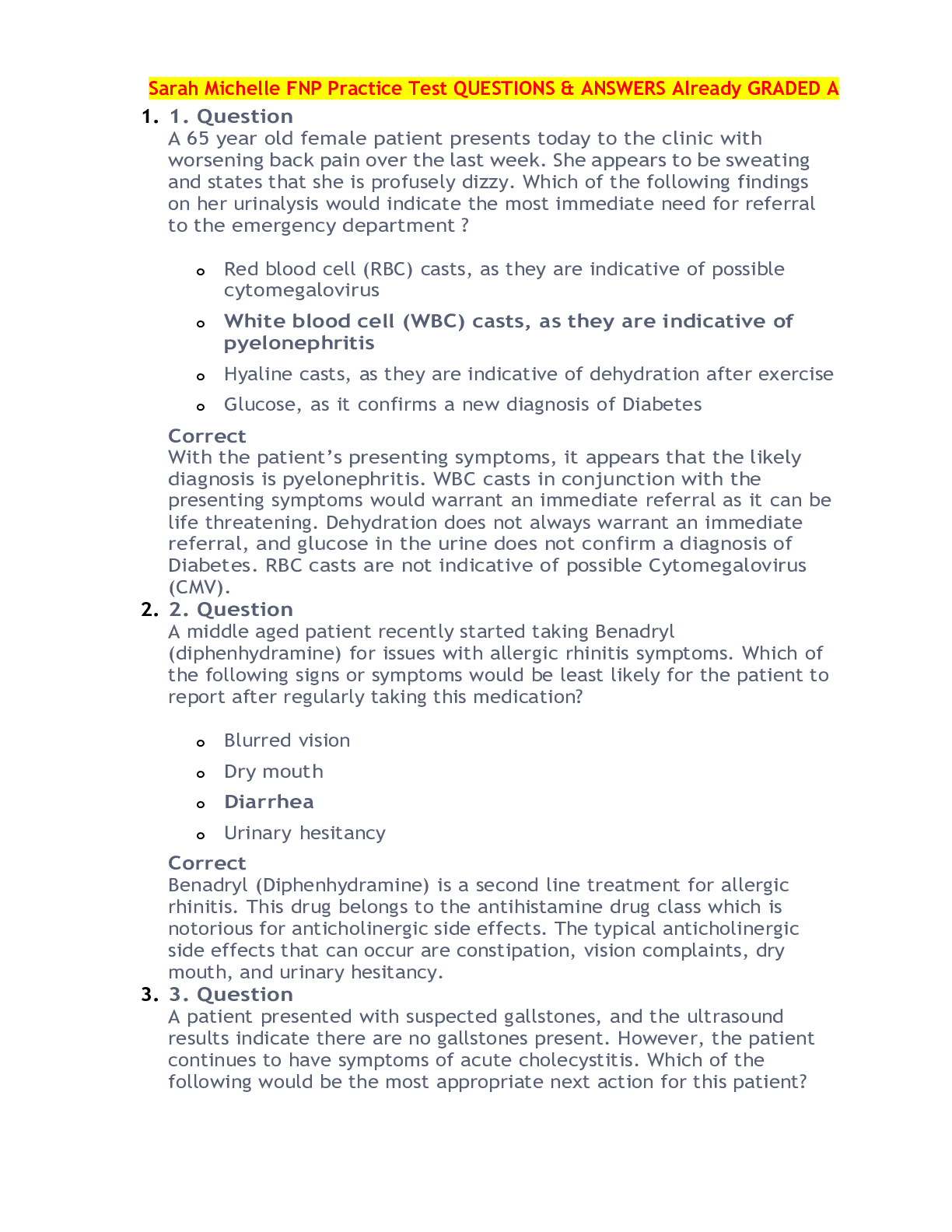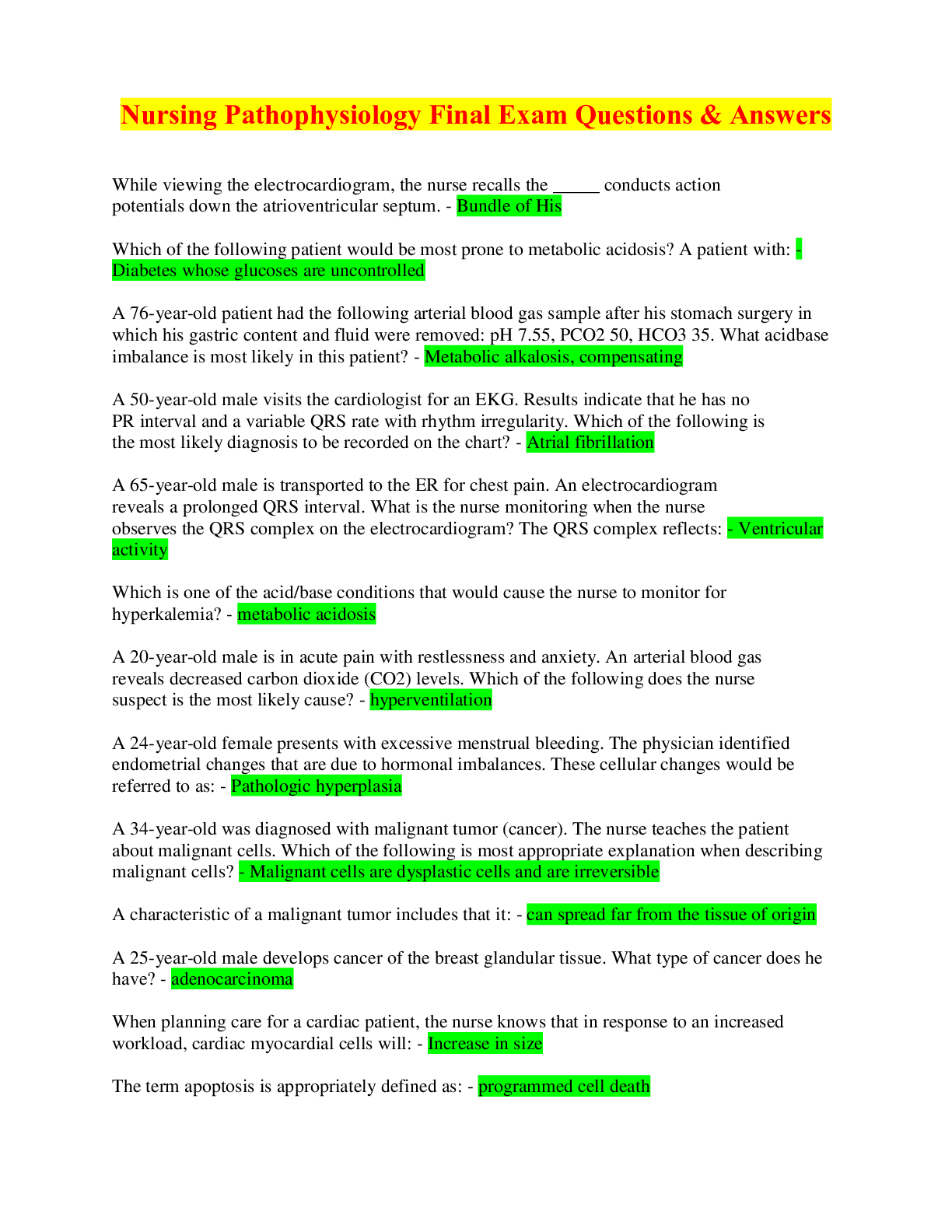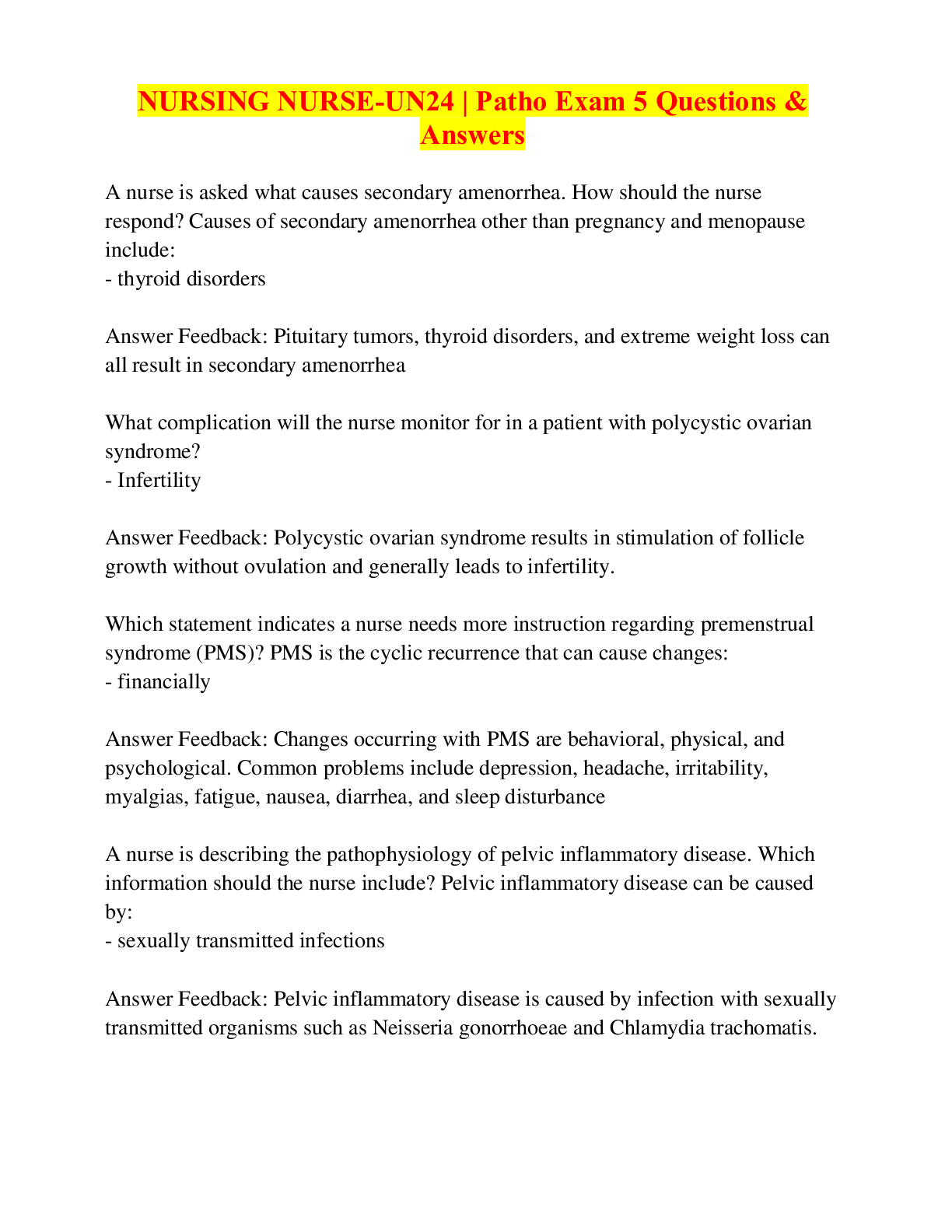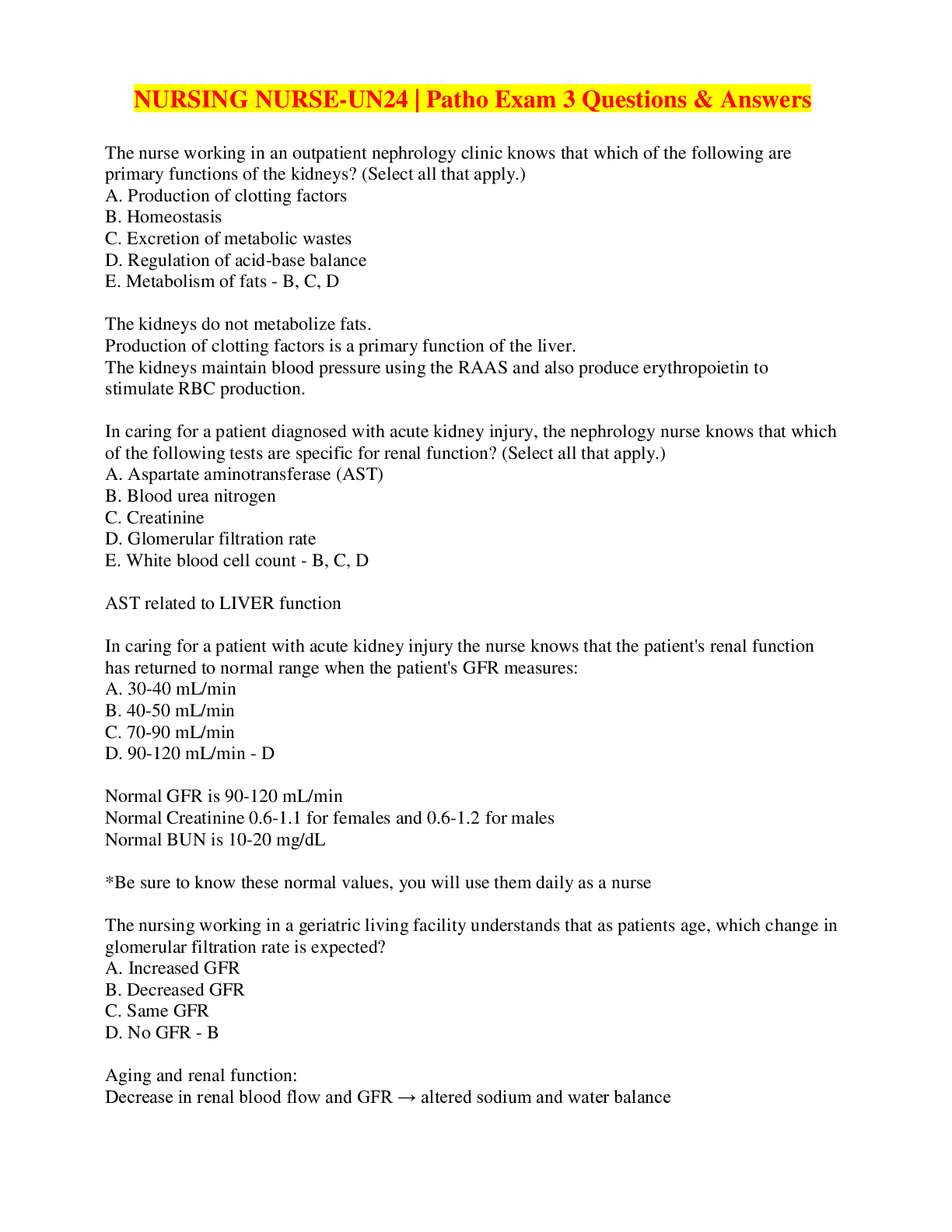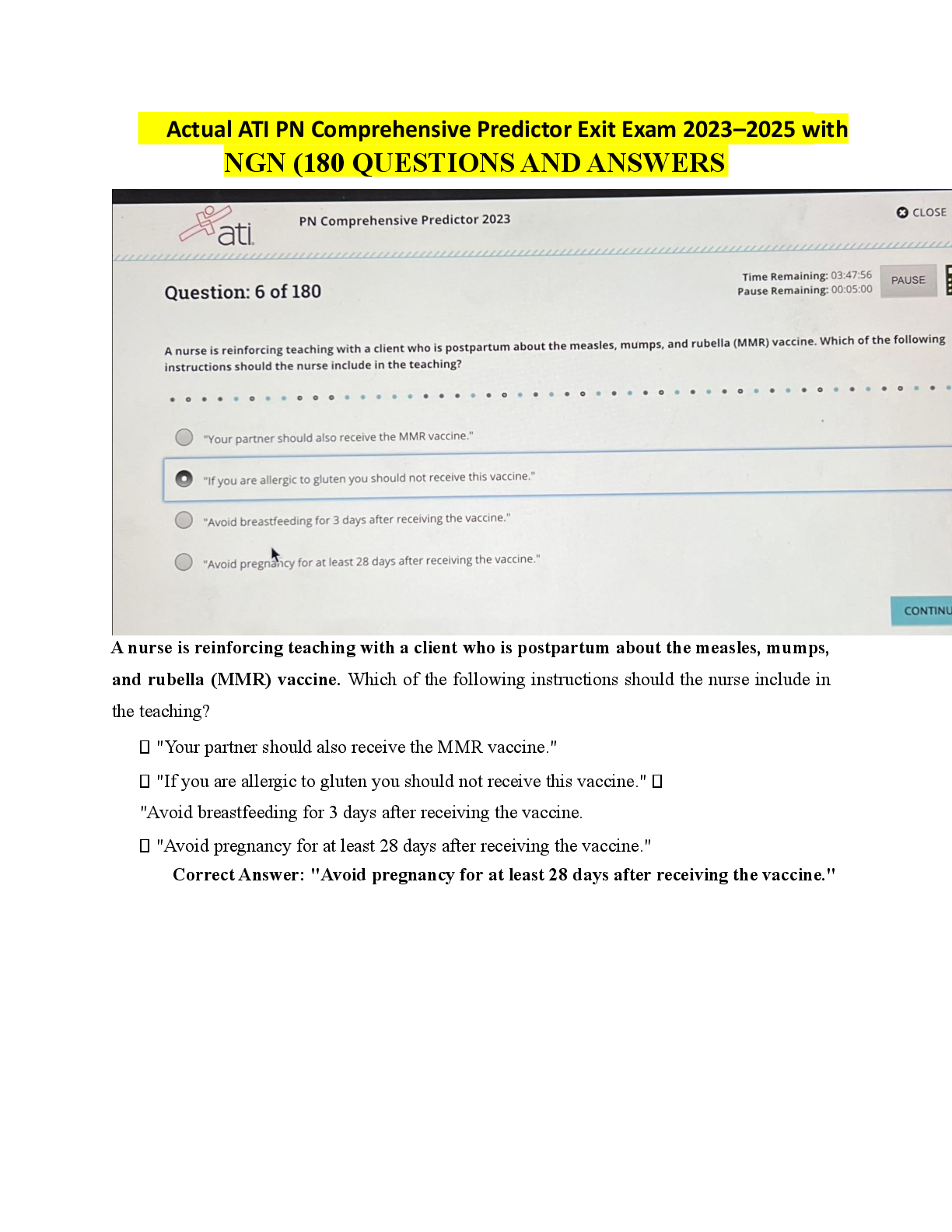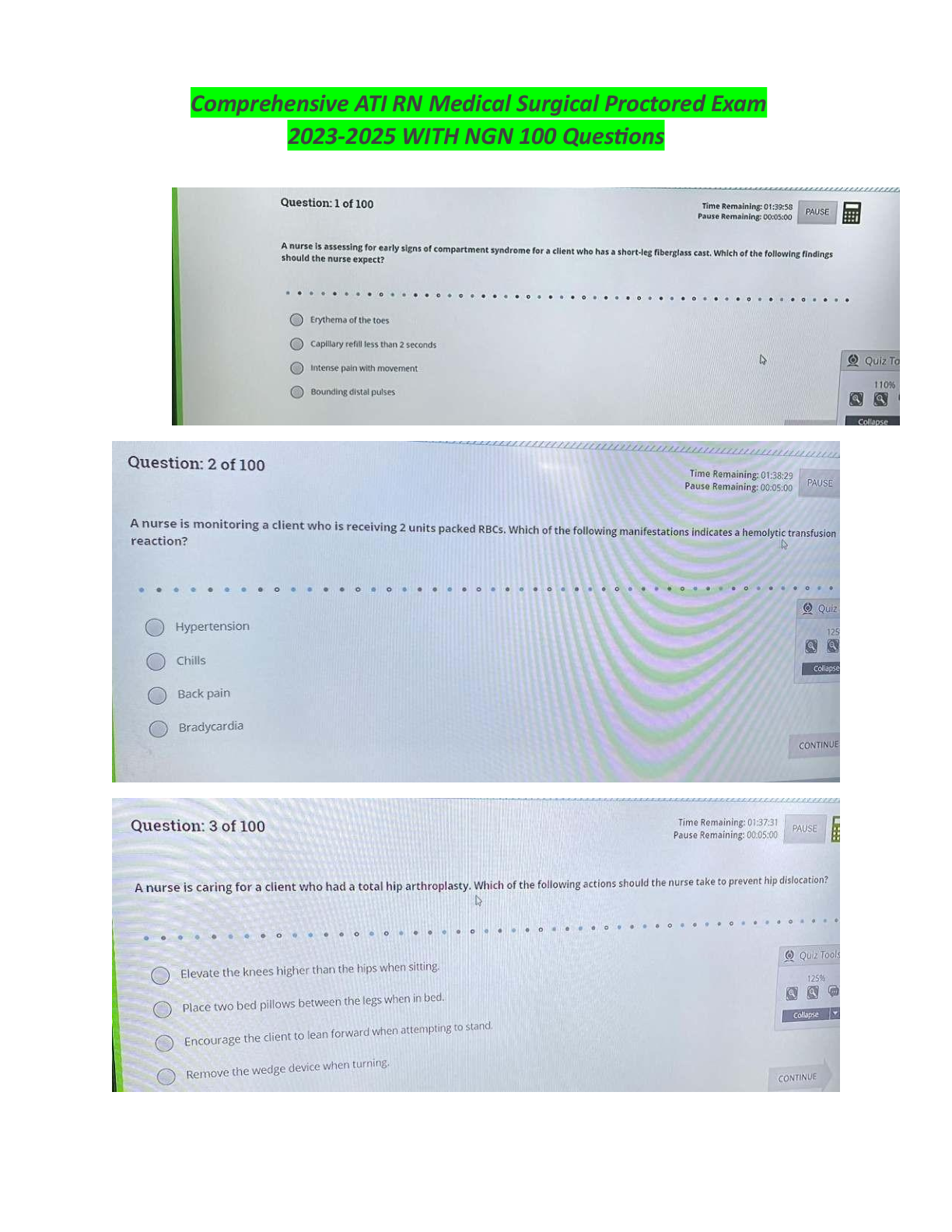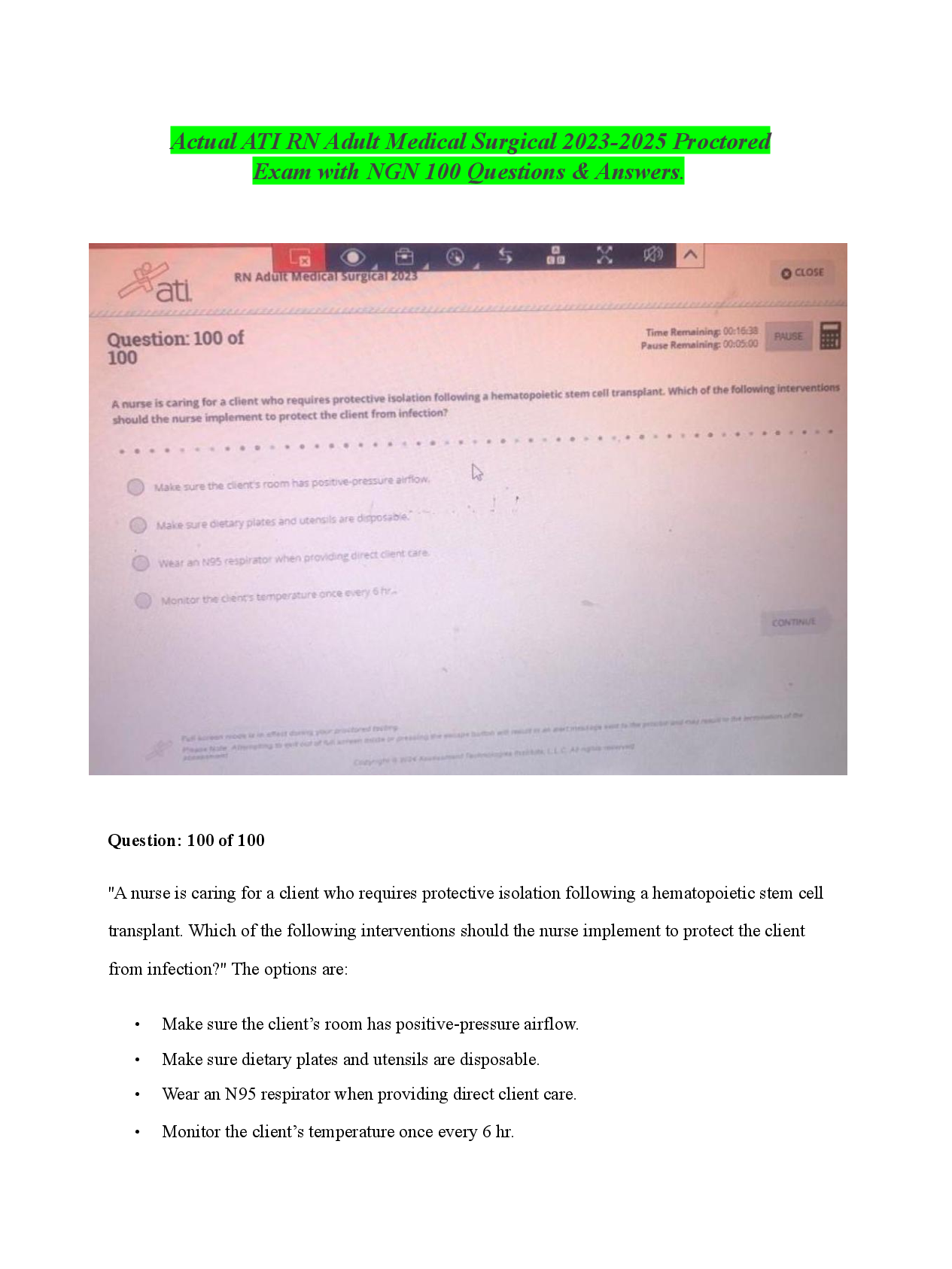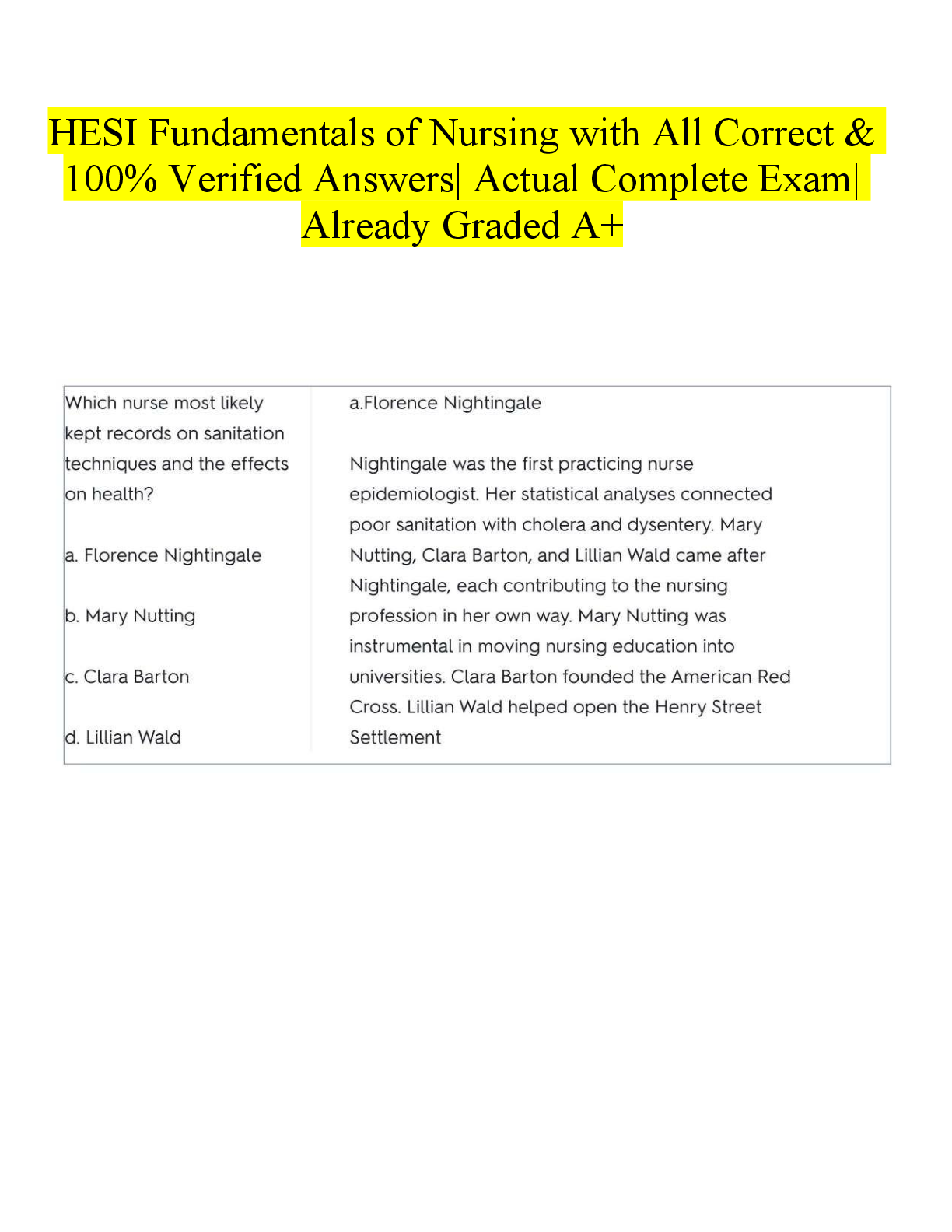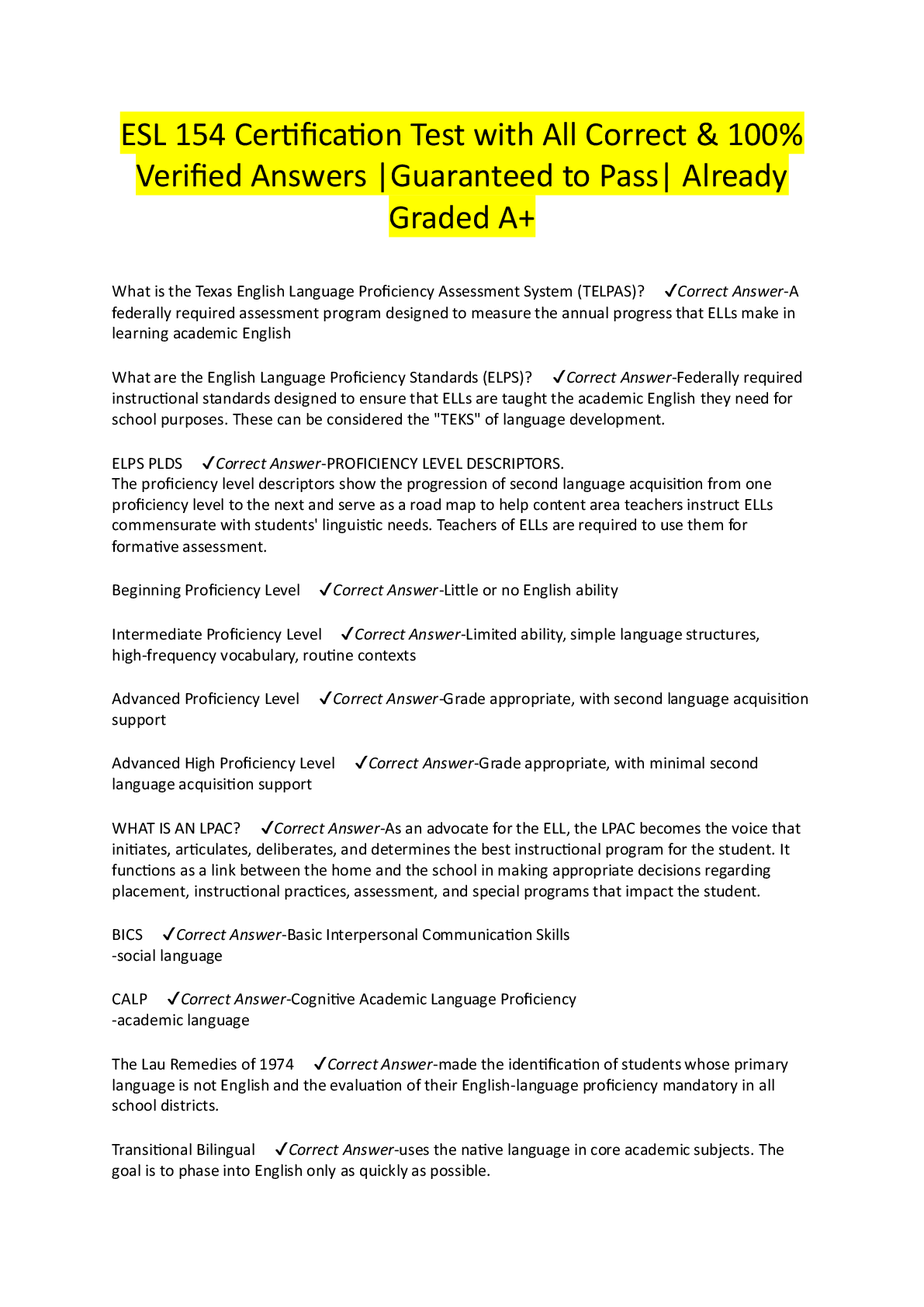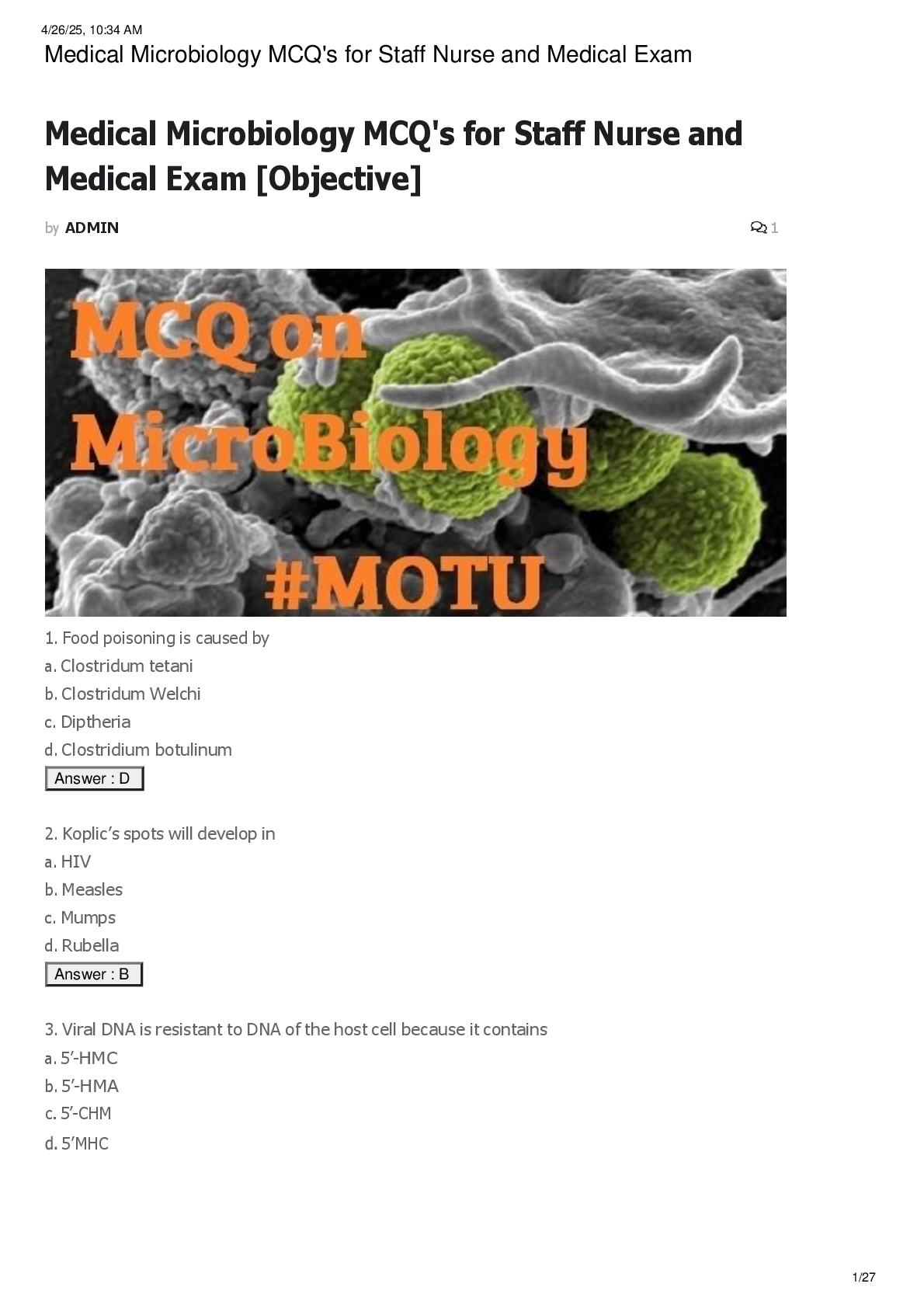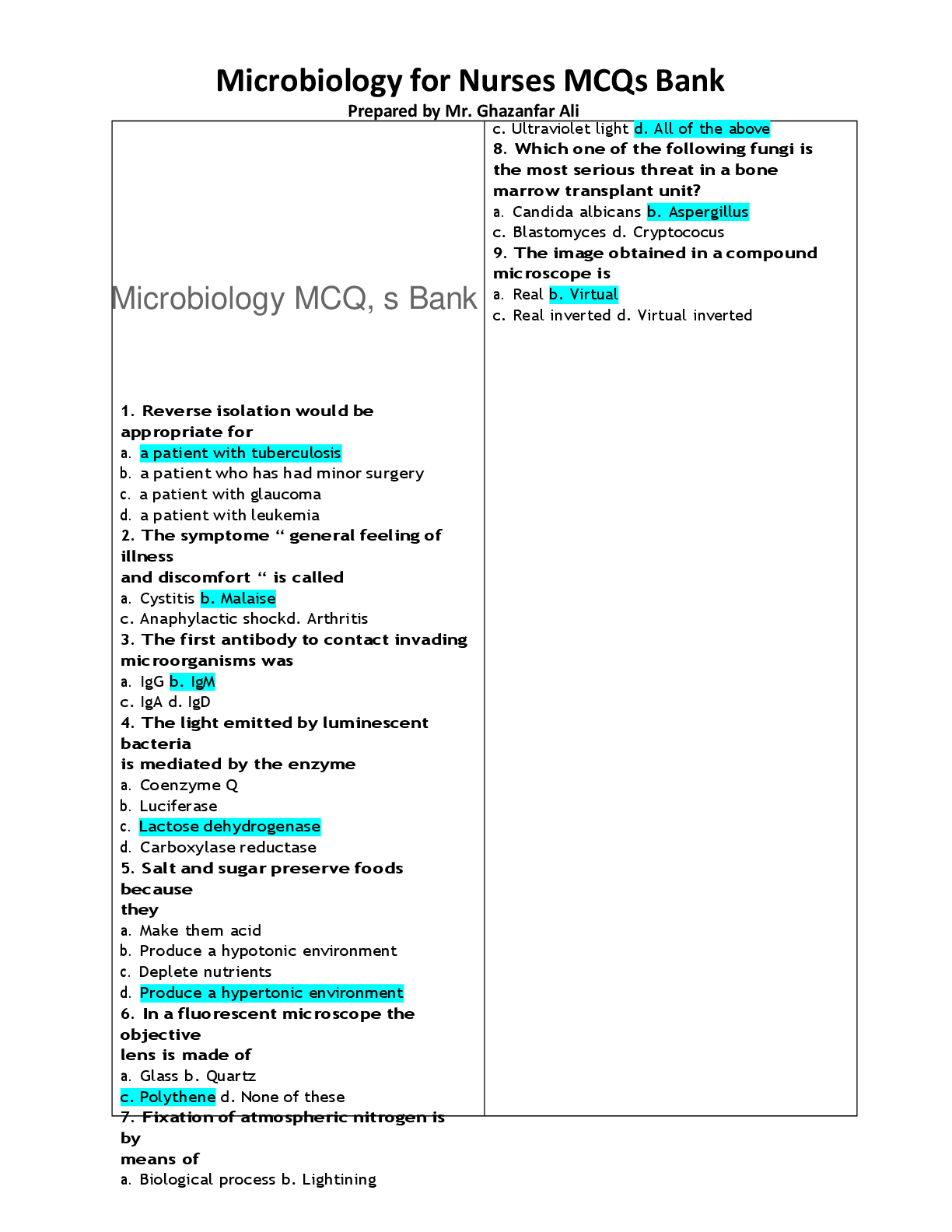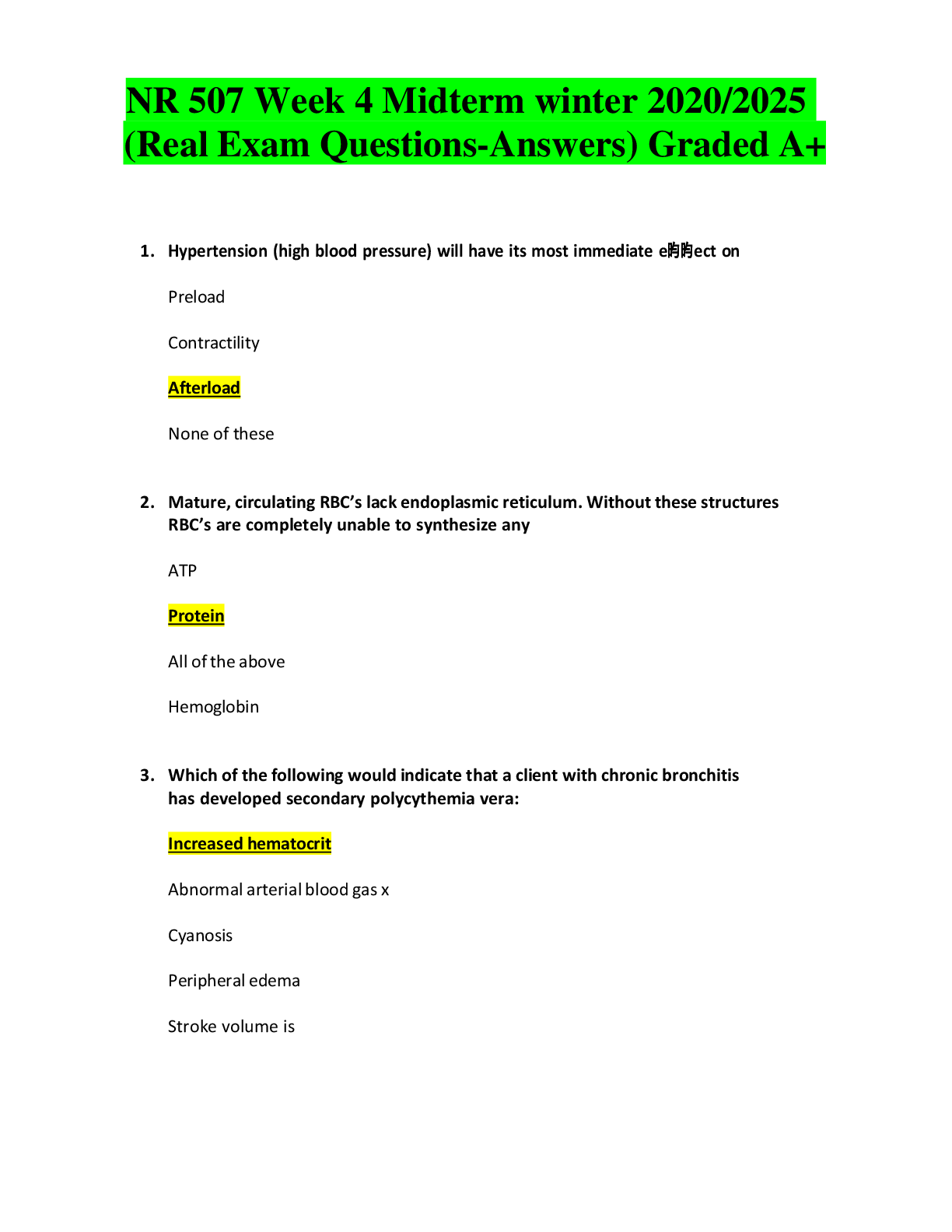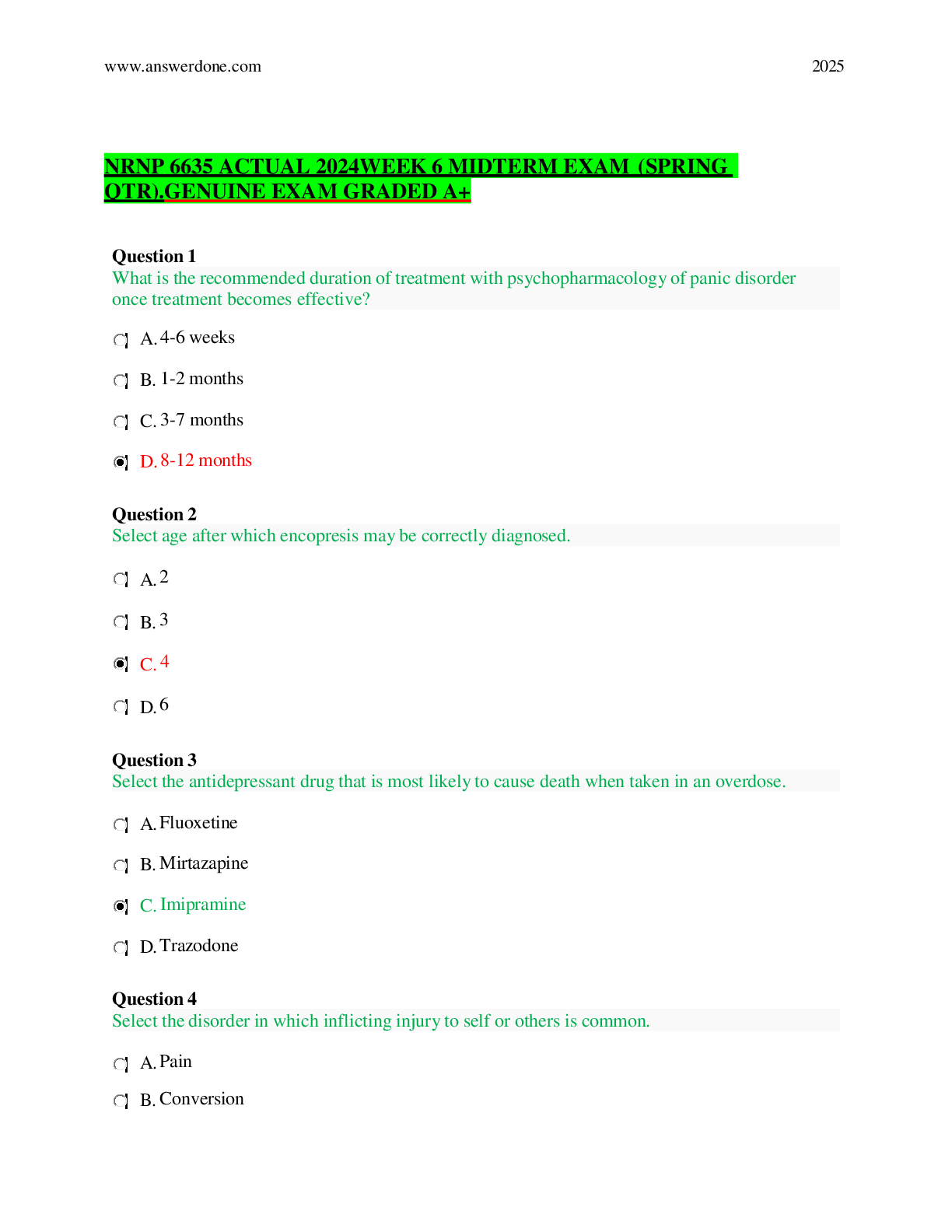PCCN Exam 1 Questions & Answers, All Answers Explained, Rated 100%
Document Content and Description Below
PCCN Exam 1 Questions & Answers, All Answers Explained, Rated 100%-A 16 year old is admitted following a syncopal episdoe while on a basketball court. The pt reports having had syncopal episodes in th ... e past, generally while in the midst of sports events. The nurse notes the pt is in SB with a rate of 55, PR interval of 0.16, QRS of 0.10, QT interval of 0.50, and a slightly peaked T wave. The nurse should anticipate A. cardiac cath the following morning B. performance of an echo C. serum and urine toxicology screens D. CBC and trop levels - B. This pt has signs and symptoms of long QT syndrome. This condiition is a congenital disorder characterized by a prolongation of the QT interval on ECG and propensity for ventricular tachyarrhythmias, which may lead to syncope, cardiac arrest or sudden death, Imaging studies, such as echocardiography, may help to exclude other potential reasons for arrhythmic events or associated congenital heart diseases. ANy young person with syncope that occurs during exercise or in any other circumstance in which a surge of adrenaline levels was likely to have been present should have long QT syndrome specifically ruled out A cardiac pt with with DNR status is being managed medically. The nurse notes a new cough, thick yellow sputum and a temperature of 101.4 (38.4) Coarse crackles are present in the right upper field. The nurse should most immediately anticipate A. blood and sputum cultures followed by a broad spectrum abx B. mucolytics and judicious IV fluid administration C. an antyipyretic and conservative management D. NPO status and encouragement of frequent activity - A. This pt symptoms are consistent with pneumonia. Management should include abx therapy, oxygen therapy for hypoxemia, mechanical ventilation if acute respiratory failure develops, fluid management for hydration, nutritional support, and treatment of associated medical problems and complications. A fellow employee confides to you about a personal addiction to narcotics. The colleague has not sought professional help but is considering the need to do so. Conversation further reveals she has been forging prescriptions to obtain drugs. When you ask her to report this to the supervisor, she refuses and asks you not to share what you spoke about. What is the nurse best course of action A. confidentially report the conversation to the EDA B. disregard the conversation and hope the situation resolves C. remove the prescription pads and limit her access to them D. speak with the nursing supervisor - D. Nurses who divert drugs pose a significant threats to patient safety but also become a liability to healthcare organizations and the nursing department where the diversion occurred. Healthcare and nursing leaders have a responsibility to ensure that security systems are in place to prevent diversion and protect pt if nursing impairment is suspected as a result of drug diversion. Nursing leaders must consider legal, regulatory, ethical, humanistic and practical considerations in resolving this issue. The nursing supervisor must be notified immediately and in a private area. This is a very sensitve issue. A frail, elderly pt recovering from an exploratory laparotomy was extubated following a prolonged period of mechanical ventilation and IV sedation. She continues to receive PRN opioids for pain. Today, the nurse notes occasional combativeness, fluctuating lethargy and poor short-term memory. Data are as follows BP 104/60 HR 87 RR 24 O2 sat 95% on 2L via NC The nurse should recognize that A. mobilization should be limited to prevent injury B. the RASS scale should guide medication administration C. the use of Haldol is associated with lethal dysrhythmias D. moving the pt to a room with a window is a useful distraction technique - C. The most current guidelines advise cautious use of antipsychotic meds to manage delirium, as risk versus benefits data remain unclear. Another choice may be a short-term trial of an atypical antipsychotic such as Quetiapine (Seroquel) A nurse caring for a 76 year old patient in the PCU. Which of the ff age related cardiac changes should the nurse anticipate. A. decreased response to catecholamines B. increased myocardial complaince C. decreased audibility of S1 D. increased resting heart rate - A. Aging is associated with a decreased response to catecholamines. It is also associated with decrease in myocardial compliance. It is also associated with an increased audibility of S1 because of increased rigidity of the ventricular wall. It is associated with a decrease in resting HR. A nurse overhears a student recommending a popular high-protein weight loss program to a patient admitted with an exacerbation of heart failure. When the nurse asks the student why the recommendation was made, the student replies, "The patient is obese." The nurse should explain that A. this is an appropriate recommendation, since heart failure patients are often obese because of lack of energy B. heart failure patients may appear to be obese are often nutritionally challenged because of poor appetite. C. the pt should be cautioned instead to decreased protein intake to avoid azotemia D. nutritional counseling should be done by the physician - B. The pt with heart failure may be volume overloaded by 5 to 50 pounds over dry weight. A patient admitted following an episode of new onset sepsis. assessment reveals new onset dyspnea, intercostal retractions and crackles in all lung fields, pt is placed on oxygen via NC at 4Lpm which criteria ABG results should the nurse anticipate. pH pCO2 pO2 O2sat HCO3 A. 7.5 30 59 89 23 B. 7.3 51 49 81 18 C. 7.26 32 63 91 14 D. 7.48 46 52 85 28 - A. As the pt is dyspneic, the initial change in arterial blood gases will be respiratory alkalosis. This will be reflected in a decrease in CO2 and corresponding increase in pH. [Show More]
Last updated: 11 months ago
Preview 5 out of 39 pages

Loading document previews ...
Buy this document to get the full access instantly
Instant Download Access after purchase
Buy NowInstant download
We Accept:

Also available in bundle (1)
Click Below to Access Bundle(s)
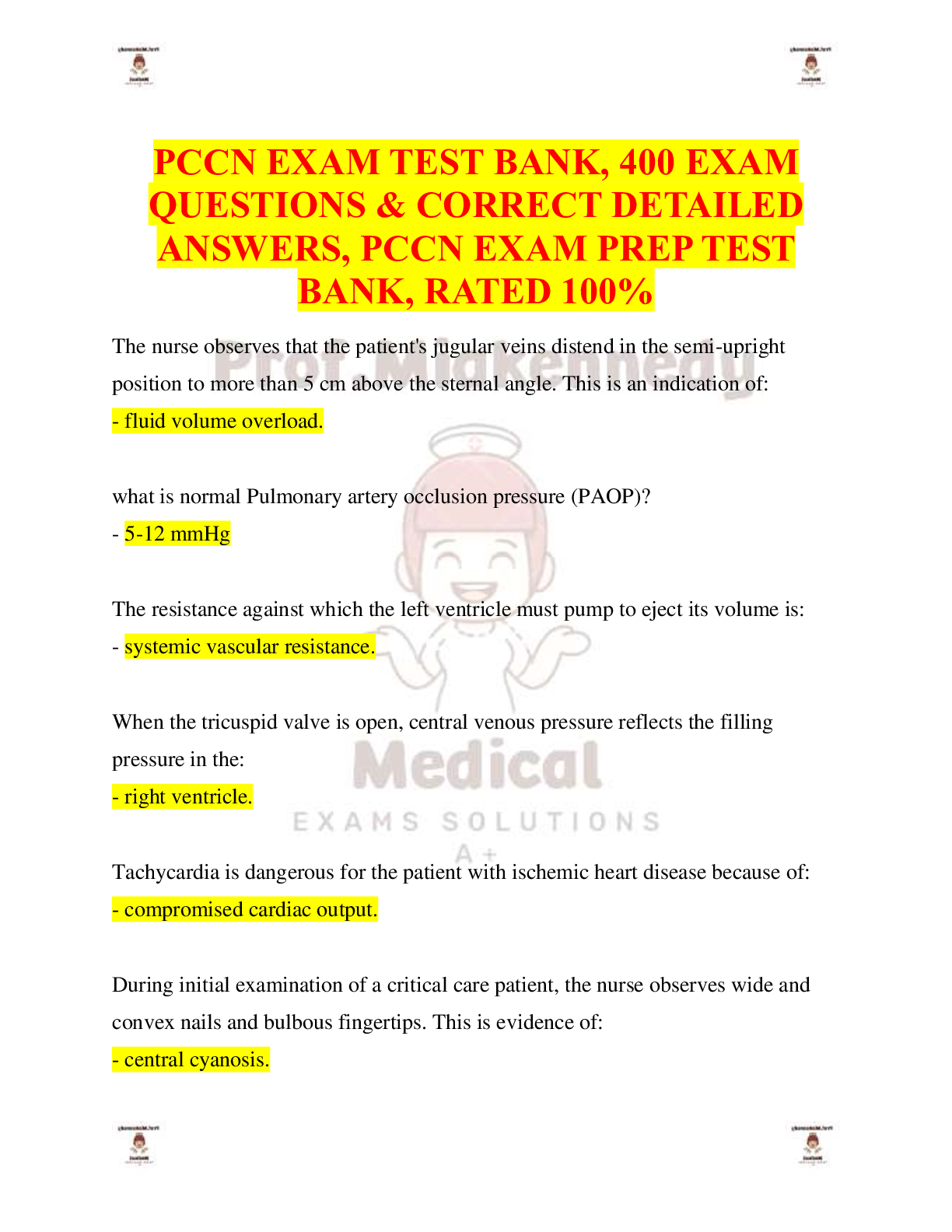
BUNDLE: Progressive Care Certified Nurse (PCCN) Exam TESTBANK, PCCN Actual Exam, Exam Prep, PCCN Exam 1, PCCN Final Exam, Final Exam Review, PCCN Practice Exam Notes 2025 Answered & Adult CCRN/PCCN Certification Practice Test Exam Questions & Answers, ALL RATED 100%
BUNDLE: Progressive Care Certified Nurse (PCCN) Exam TESTBANK, PCCN Actual Exam, Exam Prep, PCCN Exam 1, PCCN Final Exam, Final Exam Review, PCCN Practice Exam Notes 2025 Answered & Adult CCRN/PCCN Ce...
By PROF 11 months ago
$53.5
8
Reviews( 0 )
$17.50
Can't find what you want? Try our AI powered Search
Document information
Connected school, study & course
About the document
Uploaded On
Jan 02, 2025
Number of pages
39
Written in
All
Additional information
This document has been written for:
Uploaded
Jan 02, 2025
Downloads
0
Views
41

